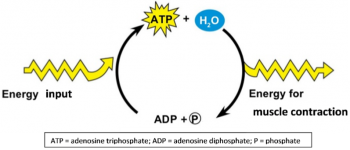Serendip is an independent site partnering with faculty at multiple colleges and universities around the world. Happy exploring!
How do muscles get the energy they need for athletic activity?

In this analysis and discussion activity, students learn how muscle cells produce ATP by aerobic cellular respiration, anaerobic fermentation, and hydrolysis of creatine phosphate. Students use their understanding of these three processes to analyze their relative importance when racing different distances.
Students learn how multiple body systems work together to supply the oxygen and glucose needed for aerobic cellular respiration.
Finally, students use what they have learned to analyze how regular aerobic exercise can improve athletic performance.
The Student Handout is available in the first two attached files and as a Google doc designed for use in distance learning and online instruction. The Teacher Notes, available in the last two attached files, provide instructional suggestions and background information and explain how this activity is aligned with the Next Generation Science Standards.
![]()
| Attachment | Size |
|---|---|
| energy sports SH.docx | 2.04 MB |
| energy sports SH.pdf | 272.92 KB |
| energy sports TN.docx | 3.52 MB |
| energy sports TN.pdf | 422.88 KB |











Comments
2024 revision
I have streamlined and focused the Student Handout to complement, rather than duplicate, the new activity “How do food molecules reach our muscles? – Structure and Function of Organ Systems, Organs and Cells”. I have also clarified several questions in the Student Handout. The Teacher Notes have been revised for clarity and to accommodate the changes in the Student Handout.
Ingrid
2020 revision
The revised Student Handout has expanded and clearer sections on “How Oxygen and Glucose Get to the Muscles” and “How Regular Aerobic Exercise Can Improve Athletic Performance”. Additional revisions have clarified the Student Handout and Teacher Notes.
Ingrid
2018 revision
In the 2018 revision, I have reorganized and revised the Student Handout to build understanding in a more logical sequence, reduce redundancy with other learning activities, and focus more on basic phenomena.
Biology Class (High School)
Hello,
I am a special education teacher at Pikeville High School in Pikeville, KY. I am so happy and excited that I am able to use this lesson to help the entire learn about the practical nature of Biology. I appreciate the ability to use this lesson and how well it was designed for students from multiple viewpoints.
Thanks for your encouraging feedback!
It is always good to learn about how our activities are helpful to teachers.
Ingrid
2016 revision
This activity has been revised to improve clarity of the Student Handout and accuracy of the descriptions of chemical energy and energy metabolism.
Post new comment